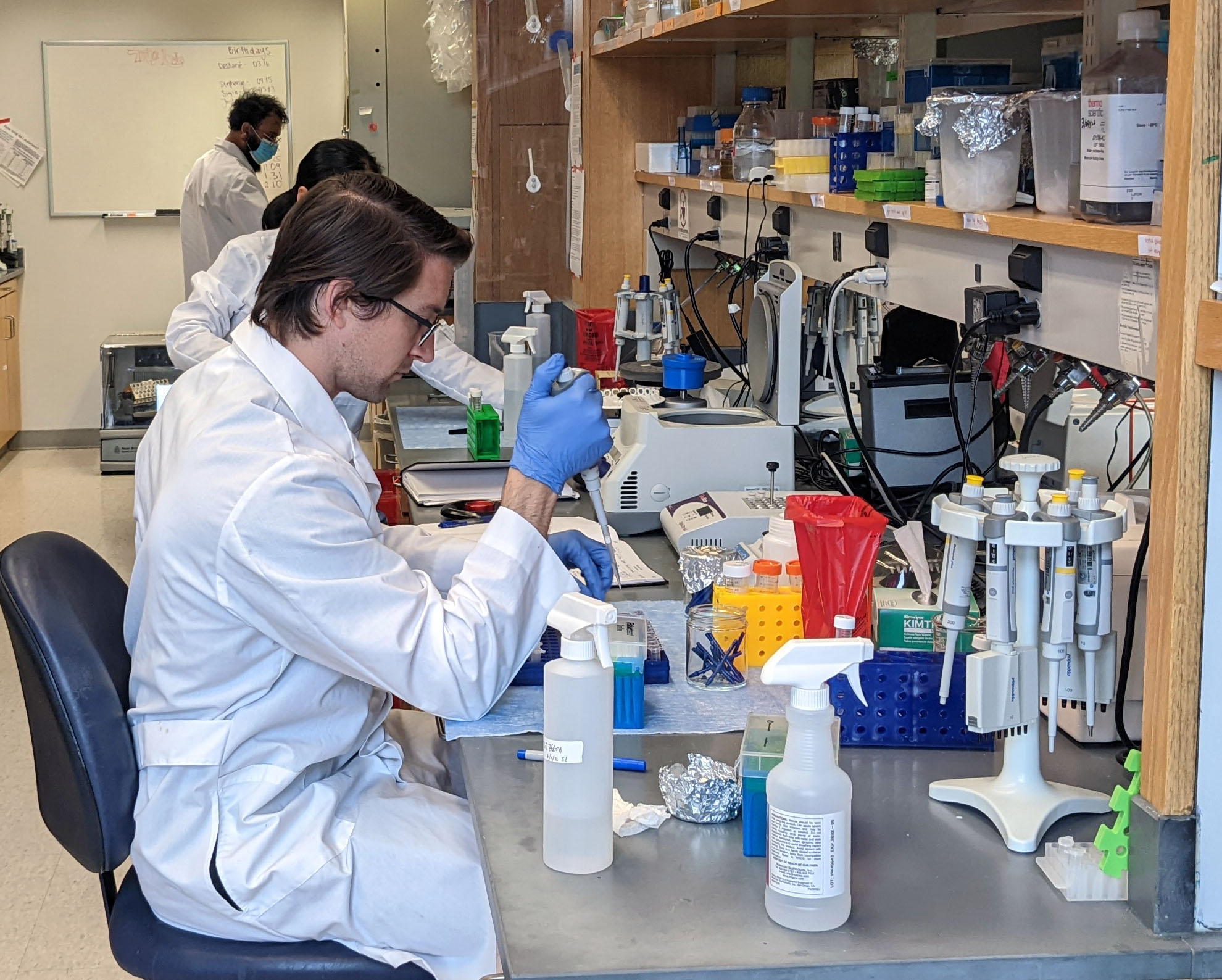Insect Immune Insights: Researchers Unveil Immune System Dynamics
By Andy Flick, Evolutionary Studies scientific coordinator

Justin Critchlow, a recent Ph.D. student in Ann Tate’s lab, just published a paper with the labmates Arun Prakash (postdoctoral researcher), Katherine Zhong (former undergraduate), and Tate, uncovering the intricacies of beetle immune dynamics. The paper was just published in PLoS Pathogens, “Mapping the functional form of the trade-off between infection resistance and reproductive fitness under dysregulated immune signaling.” It delves into the microscopic realm and unravels the orchestrated defense mechanisms led by the molecular regulator cactus. This breakthrough reveals the nuanced ballet of beetle immunity, shedding light on the intricate interplay between protection and physiological costs. This paper sheds light on the dynamics of survival, resilience, and the profound complexities inherent in evolutionary adaptations.
The team used a novel approach to vary the expression of the regulatory protein cactus in red flour beetles. This regulatory protein acts as a kind of manager that controls the activity of the immune system in red flour beetles, like a switch that can be turned up or down to adjust how strong the immune response is. They adjusted the magnitude of Toll pathway activation, and observed the consequences on immune output, survival to bacterial infection, and various health and reproductive parameters. The Toll pathway is like a series of traffic lights for the beetle’s immune system. When the pathway is activated, it’s like the green light is on, signaling the immune system to kick into action and defend against infections.

According to Tate, “we’ve known for a long time that investment in immunity is subject to many trade-offs, but studies that actually define the functional form are rare. This matters when we want to predict how extra investment, for example against relatively innocuous or virulent parasites, will shake out for organismal fitness.”
The key result of this work is that increasing the intensity of immune pathway activation in red flour beetles enhances their immune output and survival to bacterial infection. However, it also has severe consequences on female egg production, gut health, body mass, and lifespan, highlighting the significant impact of small variations in immune regulation on health and reproduction.
Critchlow was thrilled when the results of the experiments supported the teams’ original hypothesis.
“The moment that stands out the most is when I first measured the immune output of our beetles after giving the different doses of dsRNA,” Critchlow said. “I remember taking a deep breath before looking at the RT-qPCR results and instantly seeing clear differences between treatments in the exact way we predicted. It is the kind of moment you hope for your whole graduate school career.”
Following this significant result, the research shifted toward understanding the balance of cactus stability crucial for maintaining beetle homeostasis. This redirection uncovered a fundamental link between disruptions in cactus transcription and notable changes in key host traits, specifically with respect to reproduction.
Critchlow continued, “our initial experiments focused on using our typical dsRNA dose targeting cactus. This led to a considerable increase in the beetle immune response and rapid mortality. So, we realized that stability of cactus is vitally important to maintain beetle homeostasis. What we did not expect to see is how even the smallest disruption in cactus transcription can lead to massive changes in host traits like reproduction.”
Tate concluded with some big picture thoughts.
“Given the complexities of beetle immune responses revealed in this study, we want to integrate this experimental system into broader theory we are developing to better understand how different types of immune response brakes work together to modulate the shape of trade-offs between investment in immunity and other life history traits,” she said.

Citation: Critchlow, J.T., Prakash, A., Zhong, K.Y. and Tate, A.T., 2024. Mapping the functional form of the trade-off between infection resistance and reproductive fitness under dysregulated immune signaling. PLoS pathogens, 20(2), p.e1012049.
Funding Statement: This work was supported by the National Institute of General Medical Sciences at the National Institutes of Health (grant number R35GM138007).